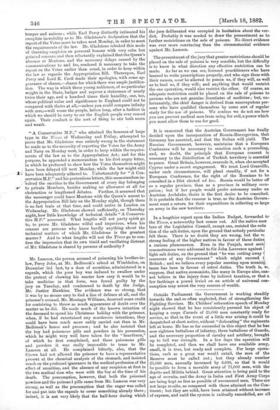Mr. Lamson, the person accused of poisoning his brother-in- law,
Percy John, at Mr. Bedbrook's school at Wimbledon, on December 3rd last, by a dose of aconitine, administered in a capsule, which the poor boy was induced to swallow under the pretext of showing his master how easy it would be to take medicine in that form, was found guilty by the jury on Tuesday, and condemned to death by the Judge, Mr. Justice Hawkins. The evidence was so strong, that it was by no means easy to find a line of defence at all, and the prisoner's counsel, Mr. Montagu Williams, deserved some credit for contriving to throw as much appearance of doubt over the matter as he did. He made much of the known intention of the deceased to spend his Christmas holiday with the prisoner, when, if he had entertained any murderous intentions, they could have been much more safely carried out than in Mr. Bedbrook's house and presence; and he also insisted that the boy had poisonous pills and powders in his possession, which be might very well have taken for the "heartburn," of which he first complained, and these poisonous pills and powders it was really impossible to trace to Mr. Lamson at all. He complained bitterly, also, that the Crown had not allowed the prisoner to have a representative present at the chemical analysis of the stomach, and insisted much on the profound ignorance in the medical profession of the effect of aconitine, and the absence of any suspicion at first in the two medical Men who were with the boy at the time of his death. The presumption, however, that both the poisoned powders and the poisonel pills came from Mr. Lamson was very strong, as well as the presumption that the sugar was called for and put into the capsule to cover something already there ; indeed, it is not very likely that the half-hour during which
the jury deliberated was occupied in hesitation about the ver- dict. Probably it was needed to draw the presentment as to further restrictions on the sale of poisons. No direct evidence was ever more convincing than the circumstantial evidence against Mr. Lamson.


































 Previous page
Previous page